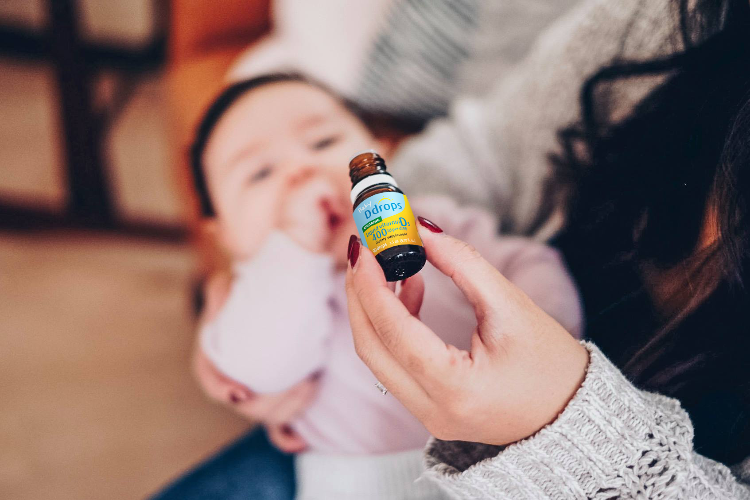September 7, 2016
Children’s vitamin D products are typically available in either gummy or liquid format. There are many features to keep in mind when choosing the vitamin D format that is best for your child.
Ease and safety of swallowing
Both gummies and liquid vitamin D are easy for children to swallow. However, with the liquid format, you don’t have to worry whether your child has properly chewed the vitamin before swallowing. Even newborns are able to take liquid vitamin D without the risk of choking. Children under five years of age are at the greatest risk of choking, and the most common cause of choking is food.[1] Foods that are sticky, slippery, or candy (candy-like) are considered choking hazards.[1]
Sugar
These days, parents are educated about the need to reduce sugar levels in their child’s diet. Sugar is recognized as a source of childhood obesity. Although gummies typically contain only two to three grams of refined sugar each, that still represents 15 to 20 per cent of the daily maximum amount of daily added sugar intake recommended by the Heart and Stroke Foundation. [2] [3]
The role of sugar in weight management is important, but when it comes to vitamin gummies, the real issue is the risk of tooth decay. Sugars in the mouth react with the saliva which generates an environment in the mouth that is ideal for oral bacteria. These bacteria then make the saliva more acidic, which can then result in tooth decay which looks like very tiny holes in the tooth.[4] The problem with gummies is not only that they contain sugar, but because of the nature of these vitamins, they tend to stick to the teeth.[5] Duration of exposure to sugars increases the risk of tooth decay.[4,5]
If you are trying to solve this problem with sugarless vitamin gummies, that is helpful, but there is still something called ‘biofilm’ that develops on your teeth that increases your chances of getting cavities. [5]
Vitamins are not candy
Ask almost any parent who has given their child a gummy vitamin what their child thought of it, almost all of them will respond by saying that their children thought they were just like candy gummy bears. Of course, as parents, we all want to do what we can to get those vitamins in our children’s little bodies, but at what cost? Children get into things and adults aren’t able to see everything. We monitor how many vitamins our children get in a day, but if little ones find the container of vitamins themselves and think they are candy, they could mistakenly take more than they should. [6] Although vitamin D overdoses are rare, if taken in excessive amounts, this could cause harm.
Ddrops® liquid vitamin D drops do not contain sugar, coloring, or preservatives. They don’t have a taste, so they are easy to give to your child without the added sugar and risk of giving too many. Ddrops® products are also designed carefully to incorporate several important safety features.
[1 ]New York State Department of Health. Choking Prevention for Children. March 2015.[2] Marijke Vroomen Durning, Forbes Health, Medicine or Treats? Gummy Vitamins and Chocolate Calcium Chews Blur the Line. September 12 2013. https://www.huffpost.com/entry/do-gummy-vitamins-actuall_b_7034380
[3] Heart and Stroke Foundation. Children should eat less than 25g of added sugars per day. August 22, 2016. https://newsroom.heart.org/news/children-should-eat-less-than-25-grams-of-added-sugars-daily
[4] Riva Touger-Decker and Cor va Loveren. Sugars and dental caries. Am J Clin Nutr October 2003, vol. 78, no. 4, 8815-8925.
[5] Christa Joanna Lee. Teen Vogue. Do Gummy Vitamins Actually Work? 3 Nutritionists Hash It Out. April 10 2015, updated June 10 2015. https://www.huffpost.com/entry/do-gummy-vitamins-actuall_b_7034380?guccounter=1
[6] Jena Sauber St-Joseph,, News-Press Now. Medications pose increased risk to children. Aug 16 2016.




ทิ้งข้อความไว้
เว็บไซต์นี้ได้รับการคุ้มครองโดย hCaptcha และมีการนำนโยบายความเป็นส่วนตัวของ hCaptcha และข้อกำหนดในการใช้บริการมาใช้